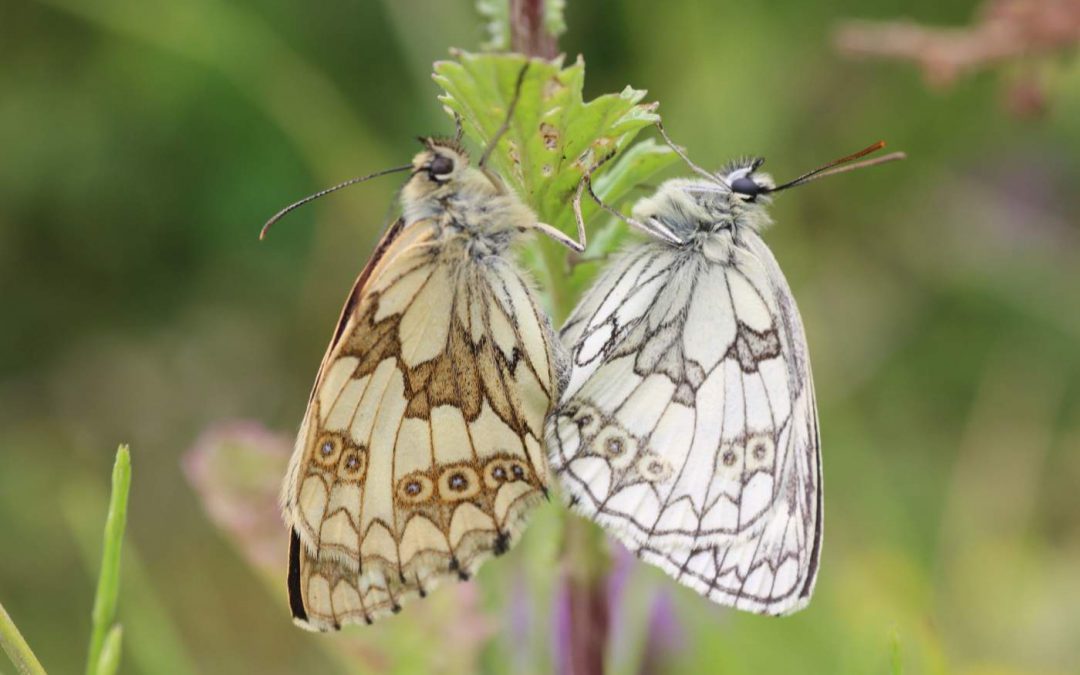Visit to Collyweston Deeps Thurssday 8th June 2023
It was a bright but breezy and cool afternoon when 17 people met in the layby on the A43 ready to visit the Beds Cambs and N’hamptonshire Wildlife Trust’s nature reserve at the old Collyweston deeps quarry. Immediately inside the gate we met with one of the feature species of the site – Dyer’s greenweed, Genista tinctoria, a bright yellow parasitic plant growing strongly in tussocks and a member of the pea family, and widespread through the reserve. Very close by was a newly emerged specimen of Knapweed broomrape, Orobanche elatior, again a parasite, standing proudly in the sunshine. The second species for which this site is noted was Dodder, Cuscuta epithymum, another parasitic plant, but this has no specific host, living on gorse, and many other types of plant, such as thyme, and in this instance bird’s foot trefoil. It looks like thin, reddish hairy strands, spreading over the surface of it’s host plant, and really hardly resembles a plant at all, since it has no leaves, and no chlorophyll. ( a bit like the hyphae of a fungus). We were too early to see the flowers which sit on the strands singly. An amazingly rich variety of flowering plants, 49 in total, which are listed on the website were discovered. A couple of the highlights were hound’s tongue and meadow saxifrage.
Butterflies were observed too – a small group of tiny delicate brown argus butterflies Arisia agestis, balanced on the wildly waving grass stems , and flitted between them, much to the enjoyment of all concerned, and common blues, Polyommatus icarus, flew across the meadow.
Also recorded were several bird species, including, buzzard, Buteo buteo, red kite Milvus milvus, and sparrowhawk Accipiter nisus, and at the end of the visit we were treated to the sight of a family of long-tailed tits, as they flitted among the bushes. A red tailed bumblebee, Bombus lapidaries, several ant hills, and orthopteran nymphs represented the invertebrates, and the only mammal sighting was a couple of rabbits sitting in the evening sunshine at the end of our visit. A fascinating reserve – one we should return to soon I hope.
Report by Linda Biddle
Visit to Collyweston Deeps June 8th 2023
Species List
Plants
Dyers Greenweed
Knapweed broomrape
Bladder campion
Birdsfoot trefoil
Lady’s bedstraw
Common Knapweed
Sorrel
Germnder speedwell
Common nettle
Salad burnett
Wild strawberry
Blackberry
Willowherb
White campion
Hedge bedstraw
Clover
Rock rose
Wild thyme
Hop trefoil
Hound’s tongue
Meadow saxifrage
White bryony
Plantain
Wild marjoram
Dodder
Eyebright
Wild parsnip
Burdock
Mignonette
Cleavers
Sow thistle
St John’swort
Mouse ear hawkweed
Greater Knapweed
Quaking grass
Hoary Plantain
Bulbous buttercup
Common Vetch
Horseshoe vetch
Pyramidal orchid
Clustered Bellflower
Small flowered cranesbill
Milkwort
Cowslip ((seed heads)
Rock rose
Dropwort
Lesser stitchwort
Black medic
Prickly sowthistle
Birds
Buzzard
Jackdaw
Wren
Chaffinch
Wood pigeon
Black cap
Carrion crow
Red Kite
Sparrowhawk
Swift
Blue tit
Great tit
Longtailed tit
Butterflies
Common blue
Brown argus
Others!!
Rabbit
Red tailed bumble bee
